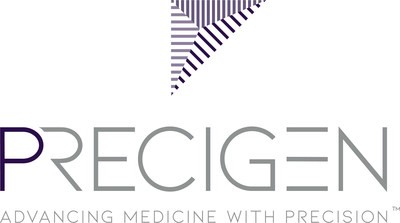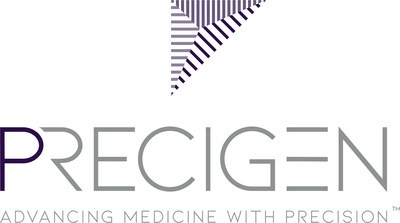
– UltraCAR-T cells eliminated tumor burden in mice following tumor rechallenge three months after prior treatment demonstrating superior expansion, persistence and improved efficacy in ovarian cancer model –
– UltraCAR-T cells were selectively and effectively eliminated by kill switch activator –
GERMANTOWN, Md., June 22, 2020 /PRNewswire/ — Precigen, Inc., a biopharmaceutical company specializing in the development of innovative gene and cell therapies to improve the lives of patients, today announced preclinical data for its innovative investigational PRGN-3005 UltraCAR-T® in patients with advanced, recurrent platinum resistant ovarian, fallopian tube or primary peritoneal cancer has been published as an e-poster and accompanying audio presentation at the American Association for Cancer Research (AACR) Virtual Annual Meeting II. The e-poster presentation titled PRGN-3005 UltraCAR-T: Multigenic CAR-T Cells Generated Using Non-viral Gene Delivery and Rapid Manufacturing Process for the Treatment of Ovarian Cancer (Abstract 6593) is part of the Immunology/Adoptive Cell Therapy session and is accessible on the AACR e-poster website.

Traditional methods for CAR-T cell manufacturing involve the use of viral vectors and ex vivo cell expansion at centralized manufacturing facilities, contributing to potentially high costs and extended waiting periods. Precigen’s UltraCAR-T platform, in contrast, is based upon a non-viral multigene delivery system combined with a rapid, decentralized manufacturing process without ex vivo expansion. Following isolation of the patient’s own T cells after blood draw, non-viral gene transfer occurs overnight at the medical center’s cGMP facility. The next day, UltraCAR-T cells are infused into the patient.
PRGN-3005 is an autologous CAR-T treatment simultaneously expressing three gene products, which results in a uniform, homogenous CAR-T cell therapy: 1) CAR to specifically target the unshed portion of Mucin 16 (MUC16), which is overexpressed on over 80% of ovarian tumors with limited expression found in healthy tissues; 2) membrane-bound IL-15 (mbIL15) to provide improved UltraCAR-T persistence and maintenance of preferred stem cell like memory phenotype; and 3) a kill switch to eliminate the CAR-T cells, if needed.
Preclinical data demonstrate the specificity and efficacy of using the rapidly manufactured PRGN-3005 UltraCAR-T cells for the treatment of ovarian tumors. Specifically, a single administration of PRGN-3005 showed significantly superior expansion and preferred memory phenotype of UltraCAR-T in vivo and significantly superior efficacy compared to traditional CAR-T resulting in all PRGN-3005 treated mice becoming tumor-free. Furthermore, rechallenging these tumor-free mice three months later with ovarian tumors for a second time (to simulate tumor relapse) led to the elimination of tumor burden without additional PRGN-3005 UltraCAR-T treatment. These data demonstrate the potential of UltraCAR-T cells to persist long-term in vivo, prevent CAR-T cell exhaustion, and mount a durable anti-tumor response with the ability to continue to respond upon tumor rechallenge.
“We are pleased to be able to share the preclinical data for PRGN-3005 that led to the IND clearance and initiation of the Phase I study,” said Helen Sabzevari, PhD, President and CEO of Precigen. “Our preclinical results demonstrate that PRGN-3005 UltraCAR-T administered one day after non-viral gene transfer has superior anti-tumor efficacy and persistence compared to traditional CAR-T cells and represents a promising opportunity for ovarian cancer treatment. We look forward to sharing the first clinical data for PRGN-3005 in the second half of 2020.”
Based on these preclinical results, the FDA approved the IND application, and the first-in-human PRGN-3005 Phase I clinical trial for advanced ovarian cancer is currently under way (clinical trial identifier: NCT03907527). The PRGN-3005 UltraCAR-T Phase I clinical study is an open-label, dose escalation study to evaluate the safety and maximal tolerated dose of PRGN-3005 UltraCAR-T delivered by intraperitoneal infusion (IP) or intravenous infusion (IV). The study population includes patients with advanced stage (III/IV) recurrent ovarian, fallopian tube, and primary peritoneal cancer who are platinum-resistant and have progressed after receiving standard-of-care therapies or are not eligible to receive available therapies with known clinical benefit.
About Ovarian Cancer
Worldwide, nearly 300,000 women are diagnosed with ovarian cancer every year1 with approximately 22,000 of them in the US2. Since early ovarian cancer is often without obvious symptoms, the disease is frequently diagnosed at an advanced stage where cancer has spread to distant parts of the body, such as the liver or lungs2,3. Five-year survival rates depend on stage and type of ovarian cancer with rates decreasing for advanced stage cancers that have spread to distant parts of the body3.
Precigen: Advancing Medicine with Precision™
Precigen (Nasdaq: PGEN) is a dedicated discovery and clinical stage biopharmaceutical company advancing the next generation of gene and cell therapies using precision technology to target urgent and intractable diseases in our core therapeutic areas of immuno-oncology, autoimmune disorders, and infectious diseases. Our technologies enable us to find innovative solutions for affordable biotherapeutics in a controlled manner. Precigen operates as an innovation engine progressing a preclinical and clinical pipeline of well-differentiated unique therapies toward clinical proof-of-concept and commercialization. For more information about Precigen, visit www.precigen.com or follow us on Twitter @Precigen and LinkedIn.
Precigen’s UltraCAR-T® Therapeutic Platform
Precigen’s UltraCAR-T platform has the potential to disrupt the CAR-T treatment landscape by increasing patient access through shortening manufacturing time, decreasing manufacturing-related costs, and improving outcomes using advanced approaches for precise tumor targeting and control of the immune system. The platform brings several key advancements: 1) Non-viral gene transfer using multigenic vectors for expression of multiple effector genes leads to better precision and control of tumor targeting and eliminates the need for virus; 2) Sustained persistence and desired phenotype of infused UltraCAR-T helps address T-cell exhaustion, a common issue with current CAR-T therapies; 3) T-cell control by incorporation of kill switch technology to potentially improve the safety profile; and 4) Rapid manufacturing of UltraCAR-T cells using our proprietary non-viral gene transfer process, which eliminates the need for ex vivo propagation, thus dramatically reducing wait times for patients from weeks to one day after gene transfer.
Trademarks
Precigen, UltraCAR-T, and Advancing Medicine with Precision are trademarks of Precigen and/or its affiliates. Other names may be trademarks of their respective owners.
Cautionary Statement Regarding Forward-Looking Statements
Some of the statements made in this press release are forward-looking statements. These forward-looking statements are based upon the Company’s current expectations and projections about future events and generally relate to plans, objectives, and expectations for the development of the Company’s business, including the timing and progress of preclinical and clinical trials and discovery programs, the promise of the Company’s portfolio of therapies, the Company’s refocus to a healthcare-oriented business, and its continuing evaluation of options for the Company’s non-healthcare businesses. Although management believes that the plans and objectives reflected in or suggested by these forward-looking statements are reasonable, all forward-looking statements involve risks and uncertainties, including the possibility that the timeline for the Company’s clinical trials might be impacted by the COVID-19 pandemic, and actual future results may be materially different from the plans, objectives and expectations expressed in this press release. The Company has no obligation to provide any updates to these forward-looking statements even if its expectations change. All forward-looking statements are expressly qualified in their entirety by this cautionary statement. For further information on potential risks and uncertainties, and other important factors, any of which could cause the Company’s actual results to differ from those contained in the forward-looking statements, see the section entitled “Risk Factors” in the Company’s most recent Annual Report on Form 10-K and subsequent reports filed with the Securities and Exchange Commission.
For more information, contact:
1 World Health Organization, International Agency for Research on Cancer, Global Cancer Observatory. Cancer Today, Estimated number of new cases in 2018. WHO IARC GCO website.
2 American Cancer Society Ovarian Cancer Special Section. ACS website.
3 American Cancer Society. Survival Rates for Ovarian Cancer. ACS website.
View original content to download multimedia:http://www.prnewswire.com/news-releases/preclinical-data-for-prgn-3005-ultracar-t-demonstrate-superior-expansion-and-persistence-of-ultracar-t-compared-to-traditional-car-t-301080945.html
SOURCE Precigen, Inc.
Source: investors.precigen.com
